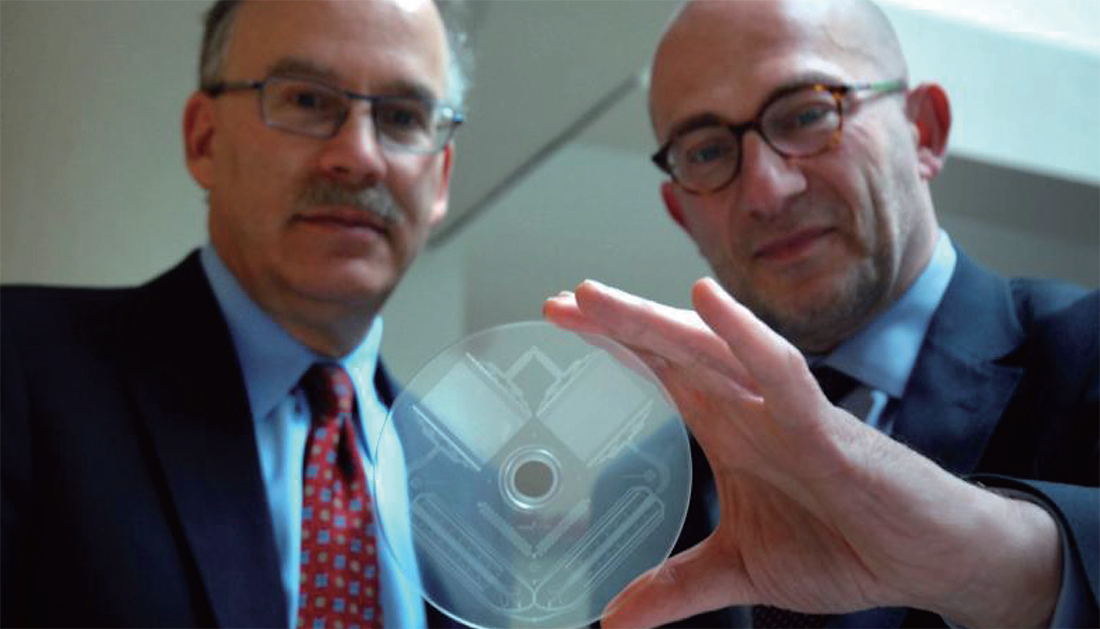암 환자별 맞춤치료 시대 ‘활짝’
암 환자별 맞춤치료 시대 ‘활짝’

A CHIP OFF THE OLD TUMOR
The truth is that cancer cells are more genetically diverse than that and are driven by the genetic mutations they carry. And that determines the course of treatment a patient will undergo. For example, non-small cell lung cancer cells have one of three known mutation types, or some combination of them, with each responding differently to drugs.
To figure out what mutations are present in cancer cells, doctors often rely on a genetic analysis of the tumor, by way of a biopsy. However, the biopsy procedure can be difficult for a patient, especially if the tumor is in the bone. In some cancers—leukemia, for example—tumors rarely form, so a biopsy is impossible. Furthermore, a biopsy seldom reveals the diversity of mutations that exists within or among tumors. But a revolutionary new blood test could replace or complement biopsies for this type of diagnostic procedure and make cancer treatment substantially more precise. The little device, called the CTC-iChip, is a microfluidic device, the first of its kind to filter out thousands of cancer cells from a blood sample for genetic analysis.
It’s simple and effective. As a blood sample enters the credit-card-sized tray, magnetic beads coated with antibodies attach to the white blood cells. Red blood cells, platelets and other smaller particles are then filtered out, while larger cells, including circulating tumor cells (the “CTCs” in CTC-iChip), pass through a magnetic field separating out the beaded white cells from the rest. What ultimately remains is a purified solution of circulating tumor cells, which can then be easily tested.
Mehmet Toner, the Harvard Medical School-based designer of the CTC-iChip, calls the test “a liquid biopsy.” It not only sets the stage for precise, less toxic drugs by isolating only those mutations that are causing the cancer, he says, but does so in “genetic real time” by highlighting drug-resistant mutations that often emerge during treatment.
Detecting resistant cancer cells immediately is critical because they can populate aggressively. “Most advanced cancer patients don’t have the time to wait for one therapy to stop working before switching to another,” says Dr. Keith Flaherty, director of developmental therapeutics at Massachusetts General Hospital. “So getting advance knowledge of resistance would be a major clinical breakthrough.”
In lab tests, the CTC-iChip has already identified more than a thousand cancer-causing mutations. As it continues to catalog the vast constellation of genetic aberrations that lead to cancer, it provides real hope in outwitting the dread disease.
암 환자별 맞춤치료 시대 ‘활짝’
실상 암세포는 그보다 유전학적으로 더 다양하며 그 안에 존재하는 유전자 변이가 핵심 역할을 한다. 그에 따라 환자에게 어떤 치료를 할지가 결정된다. 예컨대 비소세포(非小細胞) 폐암 세포는 기존에 알려진 돌연변이 유형 3가지 중 하나, 또는 그중 일부의 조합을 갖고 있다. 그리고 각 유형이 저마다 다른 반응을 나타낸다.
암세포에 어떤 돌연변이가 존재하는지 알아내려 할 때 의사들은 종종 생체검사(생검)를 통한 종양의 유전적 분석법에 의존한다. 그러나 종양이 뼈 속에 있을 경우 생검 절차가 환자에게 어려울 수 있다. 가령 백혈병 같은 몇몇 암의 경우엔 종양이 거의 형성되지 않아 생검이 불가능하다. 게다가 생검에선 종양 내부 또는 사이에 존재하는 돌연변이의 다양성은 거의 드러나지 않는다. 그러나 새로 나온 혁명적인 혈액검사법이 이 같은 유형의 진단용 생검을 대체하거나 보완해 암치료의 정확성을 대폭 향상시킬 수 있다. 마이크로유체 소자인 CTC-아이칩은 혈액샘플로부터 유전자 분석 용의 암 세포 수천 개를 걸러내는 최초의 기기다.
간단하고 효과적이다. 신용카드 만한 접시에 혈액샘플이 들어가면 항체가 코팅된 자성입자(자력을 이용해 세포추출물에서 DNA를 추출한다)가 백혈구에 달라붙는다. 그 뒤 적혈구, 혈장과 기타 더 작은 입자들은 걸러진다. 반면 혈액순환 종양 세포(CTC-아이칩의 ‘CTC’)를 포함한 더 큰 세포들은 자기장을 통과한다. 그중 자성입자가 달라붙은 백혈구만 자기장에서 따로 분리된다. 마지막엔 간편하게 검사를 실시할 수 있는 혈액순환 종양세포의 정제 용액만 남는다.
CTC-아이칩을 개발한 하버드 메디컬 스쿨의 메메트 토너 박사는 이 검사법을 ‘액체 생검’으로 부른다. 암을 유발하는 돌연변이만 분리함으로써 정확하고 독성이 덜한 약을 처방하는 토대를 이룬다. 그뿐 아니라 치료 중 종종 나타나는 약물 내성 돌연변이를 강조 표시해 그런 과정이 ‘유전학상 실시간’으로 이뤄진다고 그는 말한다.
내성 암세포의 즉각적인 발견이 중요한 이유는 그런 세포들이 급격히 불어날 수 있기 때문이다. “대다수 진행암 환자들은 한 치료법의 약효가 떨어질 때까지 지켜본 뒤 다른 치료법으로 바꿀 만큼 시간 여유가 없다.” 매사추세츠 종합병원 치료제 개발 과장인 키스 플래허티 박사의 말이다. “따라서 내성 암세포의 사전 발견은 임상적으로 혁신적인 발전이다.”
실험실 검사에서 CTC-아이칩은 암 유발 돌연변이를 1000개 이상 식별해 냈다. 암을 유발하는 수많은 유전적 이상의 목록을 계속 늘려나간다. 그와 함께 그 끔찍한 질병을 실제로 정복할 수 있다는 희망을 던져준다.
- 번역 차진우
ⓒ이코노미스트(https://economist.co.kr) '내일을 위한 경제뉴스 이코노미스트' 무단 전재 및 재배포 금지
많이 본 뉴스
1홍상수·김민희, 불륜 중 ‘득남’…혼외자 호적 '난제' 남았다
2"청년이 머무는 도시로!" 경주시, 올해 105억 규모 청년정책 운영
3"2027년에는 포항산 연어 나온다" 스마트양식 클러스터 순항
4수원 광교호수공원에 500명 모여…‘함께고워크’ 캠페인은 무엇?
5"망한거 아닙니다"...홈플러스, 고객·매출 더 늘었다
6또 터진 금융사고...‘취임 100일’ 강태영 농협은행장, 무거운 어깨
7금감원, 美 상호관세 대응 ‘총력’…매주 원장 주재 회의
8글로벌 스타트업 페스티벌 '컴업 2025' 주관기관으로 코스포·벤기협·VC협회 선정
9"만화왕국 日에서 1위 매출이 네이버웹툰?"...라인망가, 앱 매출 날았다






